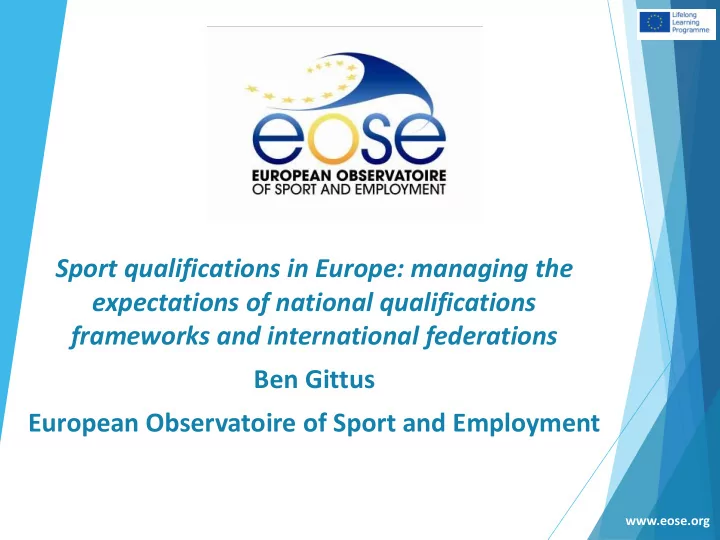

Sport qualifications in Europe: managing the expectations of national qualifications frameworks and international federations Ben Gittus European Observatoire of Sport and Employment www.eose.org
European Observatoire of Sport and Employment (EOSE) Not-for-profit membership organisation Development of the sport industry in Europe Linking employment and education Develop competent workforce Translate and promote EU VET tools for the sector Partner of European Commission www.eose.org
Sport sector at EU Level Funded skills projects European standards Sector qualifications frameworks ESCO Sport and active leisure Coaches, managers, athletes, outdoors, fitness European Sector Skills Council/ Alliance www.eose.org
EU Expert Group The European Commission Sport Unit has set up expert groups to look at particular areas related to sports policy. EU Work Plan for Sport Human Resources Management in Sport (qualifications and employment) Inclusion of Sport Qualifications in NQF's and role of international federations www.eose.org
Need for qualified workforce Member States and the sport movement recognise the need for more and better-qualified staff in the sport sector. There are many reasons for this growing demand for quantity and quality: Increased participation Support for elite sport Social, educational and health benefits Higher demands from the public – customer service, On-going professionalization in sport requires higher standards. www.eose.org
National Qualifications Recommendations of the Expert Group Sports qualifications should be brought within the scope of NQFs, and hence the EQF Transformation of the education system of the sport sector learning outcomes, making use of the same qualification level descriptors as the National Qualification Framework with a reference to EQF. www.eose.org
NQF Country Progress Finland. Sport qualifications of coaches, trainers, instructors are completely and directly integrated in the National Qualification Framework Denmark. Sport qualifications of coaches, trainers, instructors are embedded in a separate sport qualification framework with a formalized link to NQF. Cyprus. Sport qualifications are not integrated in any Qualification Framework. www.eose.org
Sector Qualifications Frameworks at the national level Italian Qualification Framework for Sport Coaches www.eose.org
International Federations – Examples Athletics International Association of Athletics Federations (IAAF) - European Athletics (part of IAAF) Basketball International Basketball Federation (FIBA) - FIBA Europe Equestrian Fédération Equestre Internationale (FEI) - European Equestrian Federation (EEF) Gymnastics International Gymnastic Federations- European Union of Gymnastics Football Union of European Football Associations (UEFA) Golf PGAs of Europe www.eose.org
International Federations European and international sport federations Normally international federation sets standards for professions – curriculum, assessment, entry Coaches, officials, others Not always enforced at national level, provide standards and template to national federations , particularly where no national qualifications Occasionally the international standard obligatory Often not based learning outcomes and don’t refer to EQF Demand from professionals Job mobility www.eose.org
International Federations The Expert Group identified that in at least 12 Member States the international sport federation standards are followed over national qualification standards. In some cases Member States also follow the international qualifications but at the same time manage to do so within the national qualification system. www.eose.org
International Federations Challenge to match regulations and standards coming from national governments with those from international sport federations A process of double reference is needed which sometimes take time to overcome difference leading to an agreement. This is the case in some Member States for athletics, badminton, climbing, diving, fitness, gymnastics, handball, judo, rugby, skiing, tennis and tracking, and in 15 Member States for football. www.eose.org
Recommendations and ways forward Encourage co-operation between international federations and those responsible for putting sport qualifications on national frameworks International sport qualifications acceptance at EU and national level Role of sport international qualifications frameworks Respect the variation in the need for specific competences between countries and the specific country environment and context Some competences developed at national level Technical and tactical skills come from “owner” of sport - IF www.eose.org
Latest work of Expert Group Mapping of the existing international qualification standards of international sport federations Mapping exercise based on desk research and interviews within a sample of 16 international sport federations The types of professional positions for which qualification standards exist The set-up of progression and pathways The content of the standards The relationship with formal education www.eose.org
Golf – PGAs of Europe www.eose.org
Football qualifications in the UK www.eose.org
Global standards for fitness industry International Confederation for Registers of Exercise Professionals www.eose.org
Conclusion Foundations have been laid for increased co-operation and positive linkage between qualifications and standards of international federations and requirements of national qualifications systems. Focus at EU level Need for further dialogue and sharing good practice www.eose.org
Recommend
More recommend